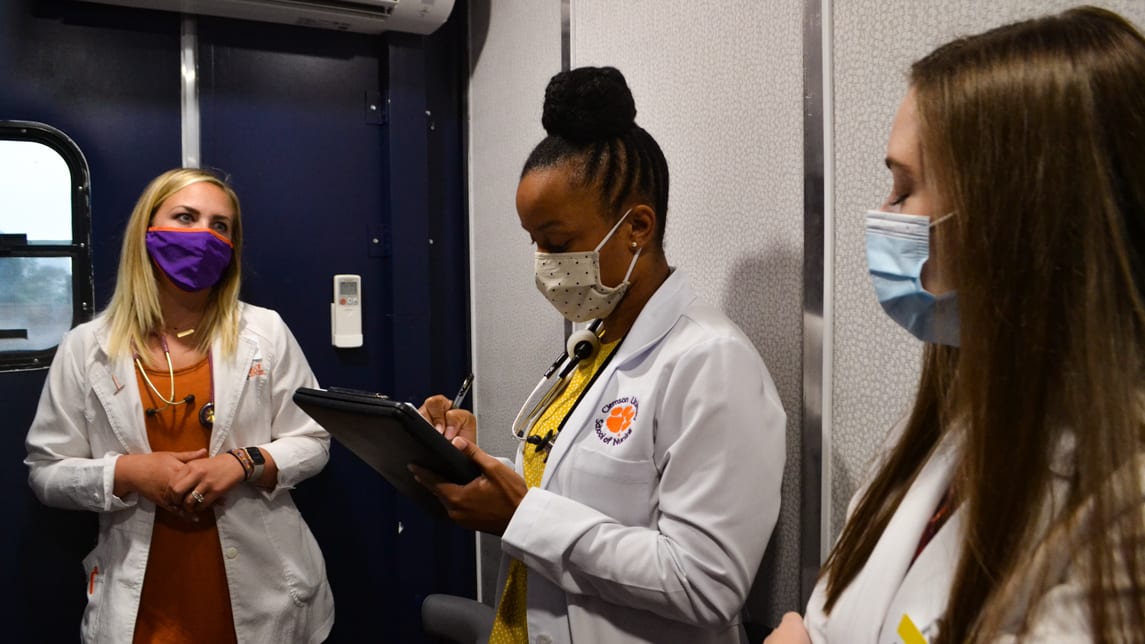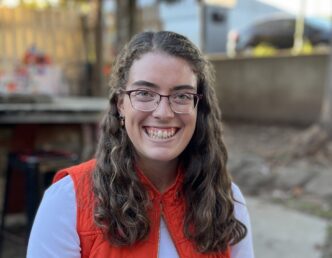The Clemson University School of Nursing has received a grant totaling nearly $4 million to help educate nurses on mobile health and ultimately increase the workforce to bring health care to patients living in rural areas in South Carolina.
The grant, “Go Mobile: Rural, nurse-led expansion and education of diverse workforce practice for underserved populations in Appalachian and Midlands, South Carolina,” was funded by the United States Health Resources and Services Administration (HRSA).
The grant will provide educational programs whose graduates will increase the numbers of registered nurses with diverse backgrounds providing nursing services to diverse, rural and/or underserved populations in the Appalachian and Midlands regions of South Carolina. In addition, the grant will enhance interprofessional partnerships between the Clemson University School of Nursing with two statewide healthcare systems, Prisma Health System (Prisma Health) and the South Carolina Department of Mental Health (SCDMH). Each entity has mobile vans, and this grant will enhance the health care experience by having nurses and nursing faculty join those mobile van team members. The mobile units will deliver care to residents in Oconee and Orangeburg counties.
The School of Nursing is one of several institutions nationwide to answer the call from HRSA to strengthen the nursing workforce through education and training specific to providing quality care in rural and underserved areas. The school will admit a diverse cohort of 45 (RN/BS and MS/DNP) financially supported students for 80 hours of immersion in expanded nurse-led mobile health practice sites.
Common barriers to rural populations seeking medical care are lack of transportation, medical costs or lack of insurance. According to a 2019 report, out of 46 South Carolina counties, Oconee County ranked 11th for health outcomes and 14.5 percent of adults delay medical care due to costs; Orangeburg County ranked 37th for health outcomes and 17.1 percent of adults delay medical care due to costs.
“Through this project, we’ve designed health service delivery for rural populations that brings health care providers to patients within their own communities and as a result, decreases delays to medical attention,” said project director and Clemson nursing professor Kathleen Valentine. “In the short term, we will educate nurses to learn this mobile model of care. In the long term, we expect that this model will be shown as effective, and our partners will provide it as an ongoing option within their health care systems eventually expanding it across South Carolina.”
In addition to program education through the usually required courses, these students will study rural populations, social determinants of health, professionalism, COVID and innovative healthcare technologies, mental health equity, decision-making and communication. They will also help track access and multiple health outcomes, including COVID and mental health.
“This work is just one of the many ways the School of Nursing, and the College of Behavioral, Social and Health Sciences (CBSHS), is meeting the land-grant mission of the University,” said CBSHS Dean Leslie Hossfeld. “We are proud of the important work the School of Nursing is doing to educate nurses in caring for rural populations.”
The other team members within Clemson’s school of Nursing include Lucia Gonzales, associate director of research at the School of Nursing and grant lead author, Adam McFarlane, lead student services coordinator for the School of Nursing; Anne Koci, nursing clinical professor; Kendra Allison, assistant nursing professor; Asa Briggs, clinical associate professor; Carolyn Swinton, clinical nursing associate professor; Stephanie Davis, professor and project director for another HRSA-funded grant, ANEW; John Whitcomb, acting director for the School of Nursing; Ann Wetsel, associate director for nursing academics at Clemson; and Veronica Parker, director of the Clemson Center for Research on Health Disparities. Project members from other organizations include Valerie Sullivan, Prisma Health mobile clinics manager; SCDMH’s Mark Kilgus, director of education and research; Veronica Deas, nurse leader at Prisma Health; and Kenneth Rogers, SCDMH director. Each member of the Go Mobile grant has a specific, essential role to assure its success.
Other staff members who are assisting with the project include School of Nursing student services coordinators Cynthia Mihalchick and Ellen Chiles; Ellen Saltzman and Mariah Meachum with the CBSHS Research Support Center; and Kristen Lawson, with Clemson’s office of Finance and Operations.
This program is supported by the Health Resources and Services Administration (HRSA) of the U.S. Department of Health and Human Services (HHS) as part of an award totaling $995,109.00 for the first year and recommended for future funding up to $4 million dollars over four years. The period of performance is July 1, 2022, through June 30, 2026, (four years). Funding beyond the first year is subject to the availability of appropriated funds for NEPQR-MHTP (HRSA-22-056) in subsequent fiscal years, satisfactory progress, and a decision that continued funding is in the best interest of the Federal Government. Clemson has successfully been awarded and completed other HRSA grants, continuation is expected.
The School of Nursing is part of the University’s College of Behavioral, Social and Health Sciences (CBSHS). Established in 2016, CBSHS is a 21st-century, land-grant college that combines work in seven schools and departments — Communication; Nursing; Parks, Recreation and Tourism Management; Political Science; Psychology; Public Health Sciences; Sociology, Anthropology and Criminal Justice — to further its mission in “building people and communities” in South Carolina and beyond.







